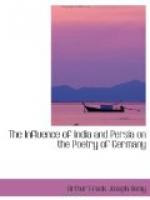Der Orient sei neu bewegt,
Soll nicht nach dir die Welt
vernuechtern,
Du selbst, du hast’s
in uns erregt:
So nimm hier, was ein Juengling
schuechtern
In eines Greisen Haende legt.[115]
The poetic spirit of the Orient had been brought into German literature; it was reserved for Rueckert and Platen to complete the work by bringing over also the poetic forms.
FOOTNOTES:
[86] Asia, Oder: Ausfuehrliche Beschreibung, etc. See Benfey, Orient u. Occident, i. p. 721, note.
[87] See Duentzer, Goethes Faust, Leipz. 1882, p. 68.
[88] This information is given by Duentzer in his Goethe ed. (KDNL. vol. 82), vol. i. p. 167, note. The French ed. of Sonnerat, Paris, 1783, does not contain the story. The German version to which Duentzer refers has not been accessible to me.
[89] Roger, De Open-Deure, Leyden, 1651, pp. 166, 167, chap. xi.
[90] It is to be noted that in Sanskrit literature devendra is an epithet of Siva as well as of Indra.
[91] Voyage aux Indes et a la Chine, Paris, 1782, i. 244 seq.
[92] See Benfey, Goethes Gedicht Legende und dessen indisches Vorbild in Or. u. Occ. i. 719-732. Benfey erroneously supposes the material of the poem to have been derived from Dapper.
[93] Bombay edition; cf. also Engl. trans. of Mahabh. ed. Roy, vol. iii. p. 358 seq.
[94] Nirn. Sag. Press ed. Bomb. 1898, p. 407 seq. Cf. also Engl. tr. in Wealth of India ed. Dutt, Calc. 1895, pp. 62, 63.
[95] For other Sanskrit sources see Petersb. Lex. sub voce renuka.
[96] Nirn. Sag. Press ed., Bombay, 1889, p. 481 seq. Cf. also Engl. tr. by Tawney, vol. ii. p. 261 seq.
[97] See for instance his discussion of Sakuntala, Gitagovinda and Meghaduta in Indische Dichtung, written 1821. Vol. 29, p. 809.
[98] Vol. ii. p. 352.
[99] Sprueche in Prosa, vol. 19, p. 112.
[100] See also Konrad Burdach, Goethe’s West-Oestlicher Divan, Goethe Jahrbuch, vol. xvii. Appendix.
[101] More than 200 poems out of 284 date from the years 1814, 1815 alone. Loeper in vol. vi. preface, p. xxviii.
[102] Loeper, ibid. p. xv.
[103] Poeseos, The Works of Sir William Jones, ed. Lord Teignmouth, London, 1807, vol. vi. chapters 12-18.
[104] Based mainly on information contained in Hammer’s Gesch. der schoenen Redekuenste Persiens, Wien, 1818.
[105] Given in Fundgruben des Orients, Wien, 1809, vol. ii. pp. 222, 495, in the French translation of de Sacy.
[106] Op. cit. p. xxxiv.
[107] Ibid. pp. xvi, xvii.
[108] Red. p. 35; Pizzi, Storia della Poesia Persiana, Torino, 1894, vol. i. p. 7. This story inspired also the scene between Helena and Faust. Faust, Act iii. See Duentzer, Goethes Faust, Leipz., 1882, ii. p. 216.




